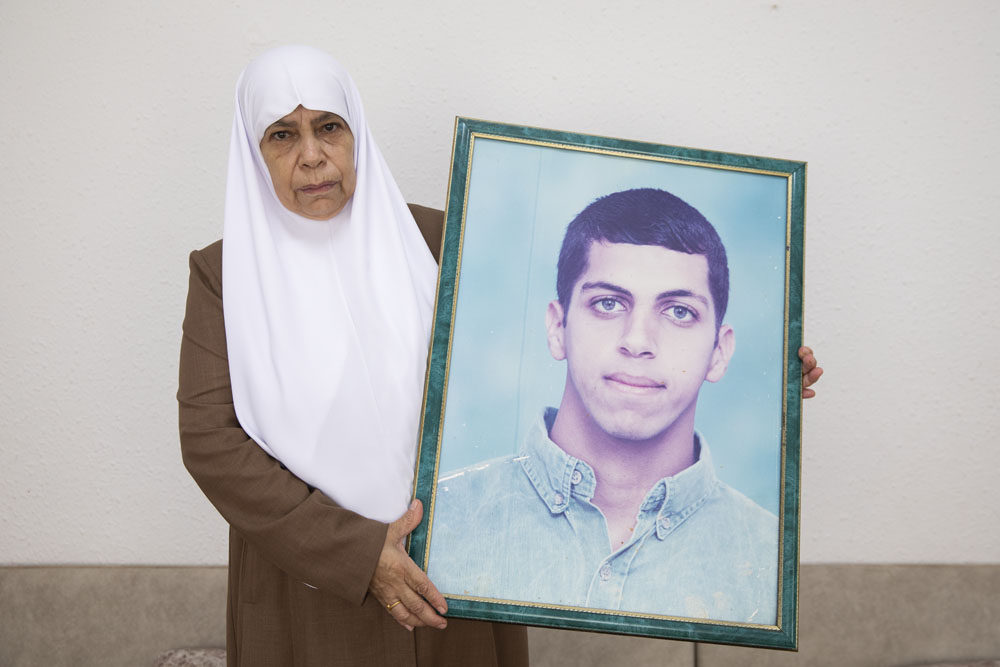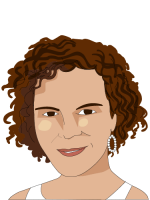Aseel Asleh, 17, from Arrabeh
Alaa Nassar, 18, from Arrabeh
Ahmad Jabareen, 18, from Mu’awiya
Musleh Abu Jarad, 19, from Umm al-Fahm
Muhammad Khamayseh, 19, from Kufr Kanna
Waleed Abu Saleh, 21, from Sakhnin
Rami Ghara, 21, from Jatt
Muhammad Jabareen, 23, from Umm al-Fahm
Ramez Bushnaq, 24, from Kufr Manda
Emad Ghanayim, 25, from Sakhnin
Wissam Yazbak, 25, from Nazareth
Iyad Lawabneh, 26, from Nazareth
Omar Akkawi, 42, from Nazareth
Twenty years have passed since the events of October 2000, in which these 13 young men left their homes to protest in solidarity with Palestinians in the occupied territories and were shot dead by Israeli police. They were boys and men who left behind families and mourning mothers. Some of these mothers are no longer with us. Those who are still alive continue to live the loss of their sons, which has only grown more difficult over time, every day for the past two decades.
Justice was never served. The Or Commission, established to look into the killings by the Israeli government following pressure by Arab leaders and the mothers of the victims, submitted its findings in September 2003. Not a single officer was put on trial.
The mothers who lost their sons continue to suffer. Here are some of their stories.
Hadiya Hussein, 60, Umm al-Fahm. Mother of Ahmad Jabareen.
“Ahmad was 18 years old when he died. He was the eldest. After he was murdered, I was left with two boys and four girls.
“When Ahmad was murdered, I was with his father on a trip in Jordan. We were supposed to return that day. Before we headed back, I even spoke to [Ahmad] on the phone. My husband asked him if anything was happening in Umm al-Fahm. Ahmad replied that everything was quiet. I turned off my phone, everything was fine, I went to have lunch and suddenly felt a sense of suffocation. I lost my appetite; I didn’t know why I felt such distress. I left the restaurant. We heard there were protests in Umm al-Fahm but I never expected what was to come.
“When we left the restaurant, Abu Ahmad drove while I sat next to him. Our neighbors were in the backseat. All of a sudden, my husband’s brother phoned to tell us that Ahmad had been wounded. Abu Ahmad immediately told me, “I feel that our son is dead.” He felt it immediately. I wanted to calm him down because he was driving, and the road was full of hills and curves. I told him, “if he is alive, we will see him, if he is not alive — God gives and God takes away.” I began to cry. I wanted to scream but I held back.
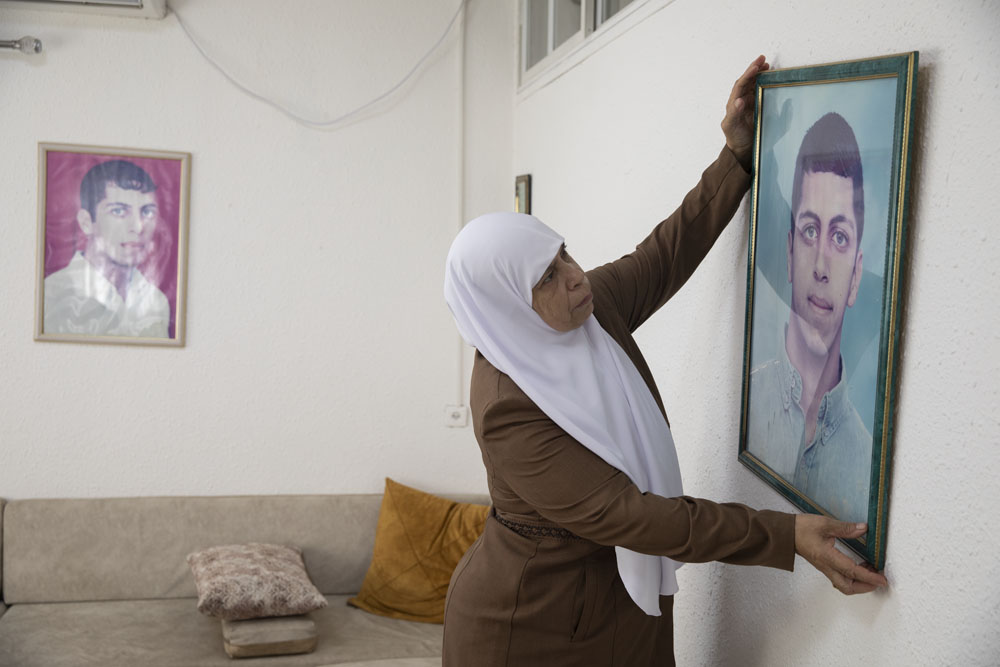
“We reached the border crossing, prayed, and switched the license plate on the car. Our phone wouldn’t stop ringing. Friends, family members — all of them were asking about Ahmed. We responded that we are out of the country and have no idea. The entire city knew he had been murdered. Only we didn’t know. There was a huge traffic jam at the border, so Abu Ahmad drove onto the curb and bypassed everyone. He was in a bad place but there was no one else who could drive. When we reached Rambam Hospital [in Haifa], we found a lot of people there from Umm al-Fahm and other towns. Ahmad was in the room by himself, connected to breathing tubes. I put my hand on his body — he was cold as ice. I said to his father, ‘My son is a shaheed, why do they abuse him and connect him to a breathing machine and tie his tongue?’ I cried and cried. My tears didn’t stop.
“Our neighbor drove us home. Our home and neighborhood were packed with people. The neighbors built a mourners’ tent and arranged all the chairs for the funeral. My twins were seven, they stood there frightened and cried. Omar was nine at the time, he also cried. Mimouna, who was 16, was strong, but 15-year-old Sansabil had a nervous breakdown and fainted. I had no idea where I was. I looked at the faces of the people and told myself, ‘It cannot be that my son died,’ even though I knew he was dead. I struggled to accept it. I asked myself what these people were doing at our house. Did my son really die? I climbed the stairs and everyone looked at me with pity. They did not know what to say to me and I had no idea what to say to them. It’s hard to describe the situation. I don’t remember much from that day, I forgot many things because of the shock. I was like a zombie. The house was full, people sat in shock and looked at me; they didn’t even console me. There was nothing to say, we couldn’t say a thing. I only remember one woman telling me that I was lucky that my son was a shaheed. The tears wouldn’t stop, that was the only thing I could do.
“The following day we received a phone call from the hospital. They told us to come because they were disconnecting Ahmad from the medical devices. I told Abu Ahmad that I refuse to allow them to donate his organs to Jews. Had my son died a natural death, I would have no problem donating his organs to anyone who needed them. But after they murdered him, I wouldn’t allow it. I didn’t go to the hospital; I couldn’t handle it emotionally. Abu Ahmad, as well as my sons, nephews and Ahmad’s friends went. My son was taken to Abu Kabir Forensic Institute [for an autopsy] because the police claimed the bullets were fired by [Palestinians] inside Umm al-Fahm. My son was shot by a sniper, the bullet struck his back. We got his body back at night. Although [the police] closed the entrance to Umm al-Fahm, it is hard to take in the sheer number of people who entered the city through the hills or other entrances. There were thousands at the funeral. I could not comprehend it; it was like a dream. I didn’t have the ability to believe he was gone.
“After Ahmad was murdered, we went to every court hearing and every meeting with the families of the martyrs. We were greatly disappointed the moment the case was closed. We felt it was a grave injustice, that they lied to us, that democracy is reserved for Jews but not for us. It is our right to protest and express frustration. We are a political family and Ahmad would regularly take part in demonstrations. We identify with the Islamic Movement, and it feels good to have a sense of belonging.
“Ahmad was very active. He volunteered with the Israel Cancer Association, he was active against land expropriations and would take part in demonstrations. He received many certificates of recognition. He loved karate and received medals; he loved to give back. Suddenly after he died, I learned more about my son from the stories about him. A boy from his class who has disabilities told me that Ahmad would always help him and accompany him during recess.
“The funeral home was open for 11 days, but we received visitors every day for more than six months. We got used to the fact that the house was full every day. It was a difficult time for the entire city. This is the first time this had happened to [Umm al-Fahm]. We are already used to this kind of thing in the West Bank, but for us it was a shock. I comforted the neighbors; I did not know from where I had summoned the power to do so. Maybe because I was a religious woman and maybe because I had other small children to take care of. I suffered in silence but managed to endure for half a year. I had to persevere. If I collapsed, our home and family would have collapsed. For a whole year I could hardly sleep and quietly cried at night. I did not want Abu Ahmad and the children to see me cry. It was only after people stopped visiting us that I finally opened Ahmad’s closet and started touching his belongings and clothes. Even the gifts I brought him from Jordan, sweatpants and sneakers and a button-down shirt, I put alongside his clothes. I did not give them to anyone. I called my sister and told her ‘I had a man at home.’ My son was tall.
“Twenty years have passed and it’s as if it was yesterday. The pain has not lessened. On the contrary, it increases with time — it grew. I miss him even more. I stopped dreaming about him, but there was one dream that stayed with me. I dreamt it was a Saturday and he was standing next to a big closet. The girls in his class were standing next to him. I asked him, ‘why are you standing like this?’ He replied to me, ‘We had an exam and I was nervous about it, but now I am no longer afraid, I am happy.’ I asked him whether the exam was on Sunday. He replied, ‘No, on Sunday I was murdered and became a martyr,’ and then said he was in heaven. We buried him on a Monday. My son was killed on October 1.”
Jamila Asleh, 68, Arrabeh. Mother of Aseel Asleh.
“I cannot believe 20 years have passed. I wonder how I managed to keep going and not go insane or commit suicide. Sometimes I feel weak and ashamed, especially since I had watched my son get murdered before my own eyes. I was a kilometer [o.6 miles] away and was unable to stop his murder.
“On the day of Aseel’s murder there was a general strike, which followed the murder of several other young men on October 1. Aseel was asleep. I had gone to my sister’s home to drink coffee on my day off. A boy from his class came to wake Aseel up so that Aseel could help him with the computer. Aseel’s nickname was “Spider 17,” he was a computer genius. After that, my other sister came over with her son, who was close to Aseel. He told Aseel that there were police officers at the edge of the village, so they left the house.
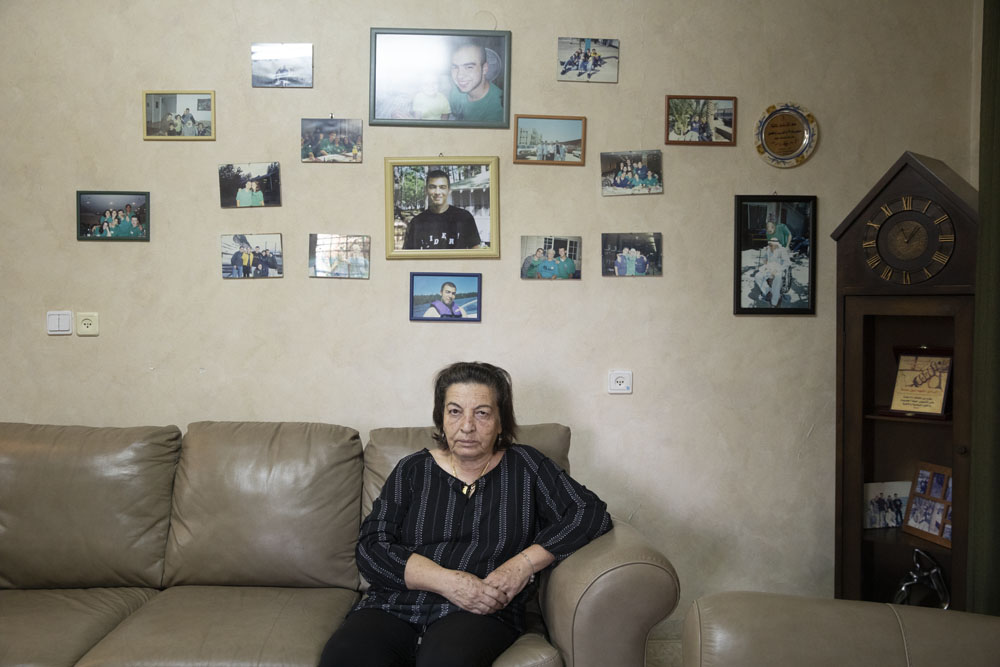
“I was standing on my sister’s porch. I saw young people passing by and asked them about Aseel. They said they had not seen him. I called him and asked where he was. He said he was near the market on his way to Wadi Salameh. I left my sister’s house and began walking in the direction of the demonstration, while asking young people there whether they had seen him. No one did. I had a bad feeling and became worried. I kept walking and got to the hill. From there I saw the cops standing under the trees while the young people were sitting on the road. I looked for Aseel. I did not have a phone, so I started asking people [for their phones] and tried to call him but there was no reception. I phoned my daughter Nardin and told her, ‘call your brother.’
“The policemen walked toward the olive grove, leaving the young men who were on the road. When they left, I saw Aseel. I recognized him from his shirt — he always used to wear green shirts. I started running like crazy among the rocks while shouting his name. There were hundreds of people there, I got close to Aseel but [the police] got there first. Aseel was sitting alone by the tree. One officer struck him with his weapon, then another shot him from point-blank range, aiming his gun at his head. I saw it with my own eyes.
“I went crazy, I started screaming and crying and running and yelling, ‘they murdered Aseel!’ The young people ran in his direction and put him in a car. They also killed Alaa [Alaa Nassar, who was shot dead that day in the same place]. I do not remember exactly what happened because I was in shock, and I do not remember who offered me to get in the car. They took me home, Aseel’s father and I took our car and drove to the medical center in Sakhnin. They did not let me in, but people there looked at me with sad eyes. I screamed and beat myself and cried, I had a bad feeling. Aseel was taken in the ambulance, the police closed the entrance to the villages and wouldn’t let the ambulance pass. The ambulance drove on dirt roads all the way to the hospital in Nahariya. We followed but I don’t remember a thing. I was in total shock.
“When we arrived at the hospital, we asked about Aseel, but no one answered us. The hospital was packed with police officers and people from Arrabeh and Sakhnin. They looked like ghosts to me. I saw Aseel’s clothes on a cart and started screaming; I thought maybe he was undergoing surgery. After 10 minutes, the members of the Asleh family were called in. My sister’s husband went alone and spoke to the doctors. They told him that Aseel was dead. He went out to hug us and cried, we understood what had happened. He did not say a word, he just cried.
“On the way back to Arrabeh there were a lot of checkpoints. I remember not listening [to the police at the checkpoints] and shouting at them, ‘you murdered my son!’ The checkpoint at the entrance to Sakhnin was the most difficult. They knew what they were doing, and they would not let me in. I told them, ‘you murdered my son’, they told me ‘if you go through, we will shoot you.’ They did not let us through because they wanted us to show we had permission. We went to the police station where an officer from the village of Rama recognized me. He told the police to allow us through the checkpoint. When we got home it was full of people. I do not even remember how I got in, what people said to me or what I said to them. I was like a zombie.
“You live your life a certain way and then your son becomes a martyr and you are no longer the same person. Although I have not changed — I remain the same opinionated, rebellious, and feminist woman who says what she thinks — but society expects you to behave a certain way. All eyes are on you. You bear not only the personal pain of the loss of your loved one, but become a symbol of the national struggle.
“I could not stop his murder, but after his death I could not break down. I have three other children. I’m not weak, I cannot stand injustice. Aseel knew I was a strong woman; the other children also knew I was strong, and I could not disappoint them. To be strong means demanding my rights and fighting to redeem my son, not crying. Yet at the same time, something inside me broke. I lost a child and my children lost a brother. I wore black, I was not in the mood to wear any other color. I also stopped wearing makeup. I had no desire to dress nicely. I did not go to weddings because the joy reminded me of the sadness. My past was full of joy, but I lost it. The joy will not return. At Nardin’s wedding I was a zombie; it was if I was unconscious. All of Aseel’s friends came to the wedding, I looked at them and saw him. The people danced and I sat and cried. Even at the wedding I wore black. I was looking for people who would tell me about Aseel, or people who would listen to me when I spoke about him.
“When the families of the martyrs began meeting, at first only the fathers came. I never believed that women must stay home, or that I should not have my own opinion. This is a big deal, there are decisions and a legal process. I cannot sit at home and let others decide. This is my son. During the first meeting, I told Abu Aseel that I wanted to join the meeting with the political leadership, the Arab Higher Monitoring Committee [an extra-parliamentary body that represents Palestinian citizens of Israel], and the other families. I joined him and then began dragging the other mothers to the meetings. I was alone at the first meeting, and the second time I was joined by Umm Omar. Slowly all the mothers joined. The pain and loss united us.
“Most of our meetings were about how to struggle for our boys. We talked about our disappointment by the political leadership and sometimes even our people, since only few [non-family members] came to court hearings. We did not even have time to talk about the pain. These were not natural deaths that you sit for a few days and people come to comfort you and that’s that. We conducted a well-publicized trial.
“I feel immense anger that no one has been tried after years of trials. We wanted the whole world to know that we were living under constant threat — a threat to our lives, to our continuity. I worry about my daughters raising their children, I worry about any woman who brings a child into this world; I do not want them to go through what I did. We once lived under the illusion that we have the right to demonstrate, but in 2000 we realized that there is no red line. October is not over; it will come back in a different form. More Octobers awaits us. We have a historical responsibility for future generations. We must not raise a generation of cowards. I do not want the next generation to accuse us of negligence the way we blamed our grandparents for what happened in 1948.
“Every day I cut out every newspaper article that was published about Aseel, even emails and letters that we received. Sometimes I would accumulate piles of press clippings in all sorts of languages — Greek, Turkish, English. I would file them on weekends. I have an entire archive dedicated to my children since they were born: every drawing, every certificate — everything is archived.
“Aseel was such a beloved child. He was active in Seeds of Peace and traveled with the organization to the United States. I took Aseel’s things — tests, things he wrote or received — I had to read everything in order to document. One day, I got to his 10th grade report card; after that there were no more report cards. His life stopped there. His life is over. My heart is torn. Life stopped with Aseel.”
Tarab Yazbak, 62, Nazareth. Mother of Wissam Yazbak and cousin of MK Heba Yazbak.
“Wissam was murdered on Yom Kippur. He was with his uncles in Nazareth’s eastern neighborhood. Wissam was close to his uncles and visited them a lot, my younger brother was close to him in age and they were close friends. I sat at home and started getting calls from my niece asking me about him. My cousin also called and asked about him.
“Wissam was someone who would call and let me know if he was coming home late. I did not understand why everyone was suddenly calling and asking about him. I was asked if he came home and said no. Suddenly his friends also came to our home and asked about him. They had heard on a local radio station that someone was killed, that his identity is unknown because they did not find his ID and that he was taken to hospital. They were worried and suspected it was Wissam because they were looking for him and he was gone. His friends took me with them to Nazareth Hospital. It was 8:30 p.m. At the hospital, we were told that the wounded man had been transferred to Rambam Hospital [in Haifa].
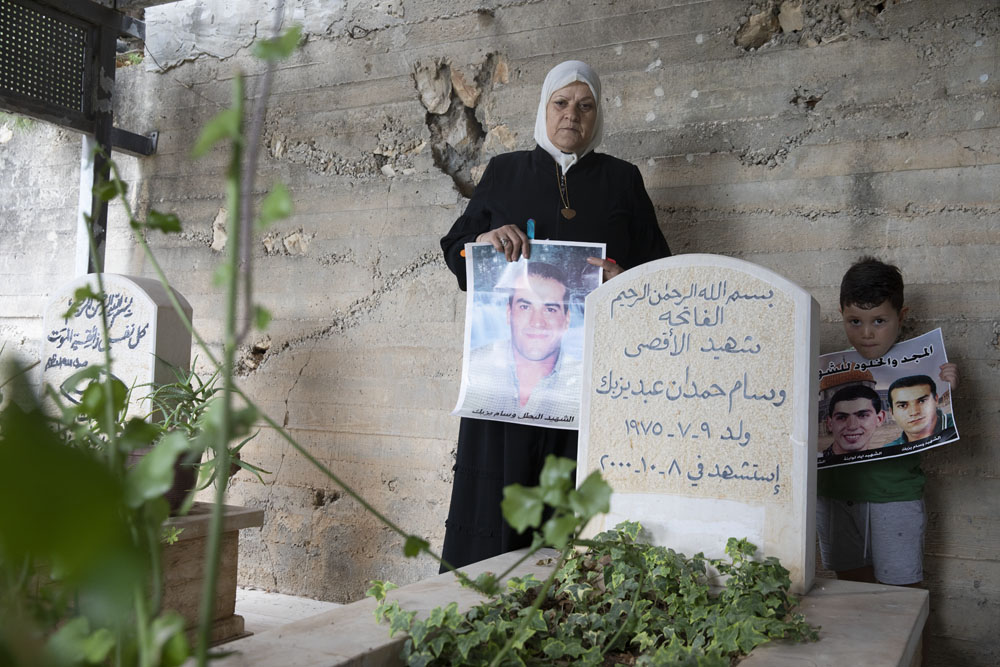
“My daughter and I arrived at Rambam, and Wissam was in the operating room. Relatives and some of his friends were there, as were members of the Arab Higher Monitoring Committee, and Wissam’s uncle, Mahmoud. People were crowding near the operating room. My brother saw Wissam before the operation. [The hospital] needed someone from the family to sign off on the operation to remove the bullet from his head. He arrived dead at the hospital with two bullets in the head. I lost consciousness in the hospital and do not remember what happened. Those who were there told me I had fainted. All I remember is collapsing and crying.
“We returned home with Wissam, he was in an ambulance and we followed. It was early in the morning, we arrived in Nazareth and found that the house and the neighborhood were full of people. They put him in the yard of his father’s house, close to our home. Nine days before Wissam was murdered, his younger brother got married and had a big stage set up for him in his father’s yard. Wissam was put on the stage, which had not yet been taken down. His younger brother was on his honeymoon, he arrived a day after Wissam was buried. There was an unbelievable amount of people at the funeral. He was so loved. The neighbors started asking, ‘How did this happen? How can Wissam not be with us?’ I was like a zombie, I did not see people, I did not recognize faces. Years later I met people who told me they were at my house on that dark day. I did not remember them. I have not forgotten him for a moment, I cannot stop crying and mourning him for 20 years.
“I separated from Wissam’s father a year and a half before Wissam was murdered. Wissam meant everything to me. He was the man of the house. If you ask about him, everyone will tell you what a man he was, sensitive and caring. Wissam worked with his father in earthworks, he was his father’s right hand. He studied business administration at a college in Haifa, we received his graduation certificate after his death.
“Two years ago, a school in Yafia [a Palestinian town adjacent to Nazareth] published a booklet about Wissam. I keep reading about Wissam and crying. He was my eldest, I was very attached to him. He was a polite, sensitive, and responsible child. Ever since he was murdered, I cannot feel joy. I married off his sister and another son seven years ago. I did not even go to their weddings. There is a big hole inside me, like a part of me is missing. I’m dead inside, the joy is dead. Although I have grandchildren and I love them, I cannot feel joy.
“Wissam’s younger sister named her son after him. His two younger brothers were very attached to him, he was like a father to them. He was the one who would take them to the mall, buy them toys, and hang out with them. I was broken. I faced two blows in the span of a year and a half: first I divorced my husband and then I lost my son.
“It was catastrophic. I will not forget or stop crying even after a hundred years go by. On the day he was murdered, I went to the family of a girl to ask for her hand. I wanted to marry him off. He had built a house, which he even had time to furnish. His house still stands empty. Everything remains as it was, I even repaired and left the clothes he wore the day he was murdered on his bed. I go to his house all the time. I sit in front of his clothes and his things; I talk to him, tell him what I am going through and cry. The blood of our boys was cheap. For years, the families of the martyrs have tried to fight in the courts — all of it was for nothing. Arab blood is cheap. All of it was in vain. I would have been relieved had the killers been punished. I hope [the martyrs] see justice before I die.
“Every time we would meet, the families of the martyrs and the other mothers would comfort me. They would hug me, even though they all lost their sons and their catastrophe was similar to my own. Maybe because I had two small children at home and no husband. Wissam was the one who supported us after his father and I separated.
“Wissam loved sports. He was a member of a gym near his grandfather’s home; he would come home from work and go to the gym. He also loved to take photos, always photographing his brothers and sisters. We have a big bag full of his photos. He loved to travel abroad; he visited the United States, Greece, Istanbul, and Taba. He was a hard worker, first he saved and then he traveled. He knew how to enjoy life. He bought a car a month before he was murdered but did not have time to enjoy it. We returned the car to its owner. Neither I nor my son were able to drive it.
“I did not leave my home for four months. I only left for court hearings, meetings with the families of the martyrs, errands, and meetings with Adalah, which represented us in court. I have not even visited my neighbors in 10 years. I am constantly at home, living with the memories. I do not have the strength and patience to sit with people, I cannot. I was taken to a psychologist after 10 years. I went once and did not go back. I have no strength, no ability to sit with anyone. Twenty years later and I still do not know what joy is and do not participate in celebrations. Even when my children celebrate birthdays for their children and play songs I get up and start crying. Wissam loved celebrations and weddings and knew how to have fun. He always said, ‘The whole city will come to my wedding. I want a big wedding.’ At his funeral there were thousands of people. Many came from all over the country, some could not get in because the police prevented them from entering.
“After Wissam was murdered, I started to be more afraid for my children. I became obsessively worried. I keep praying to God and begging Him to take care of my children, so that I will not lose another one. I will not be able to handle another crisis. I’m dead inside.
“For the first 10 days I could not eat anything — the only thing I could do was sleep. I loved sleeping for one reason: Wissam would always appear in my dreams. It felt real. I would wait in the dark to go to sleep and for him to visit me in dreams. I dream about it until today, even if not as often. For a long time, I lived in denial that he left and would return, that there was no way he would leave me, he was everything to me. When his father and I separated and he would see me crying, he would tell me, ‘I don’t like to see you cry, your tears are precious to me.’ Once after the divorce, my sister told him, ‘Take care of your mother,’ and Wissam responded, ‘She is my light. She’s my eyes.’
“I always visit his grave, crying and complaining to him and telling him what I’m going through. I pray for him and cry and wait for death.”
A version of this article was first published in Hebrew on Local Call. Read it here.

